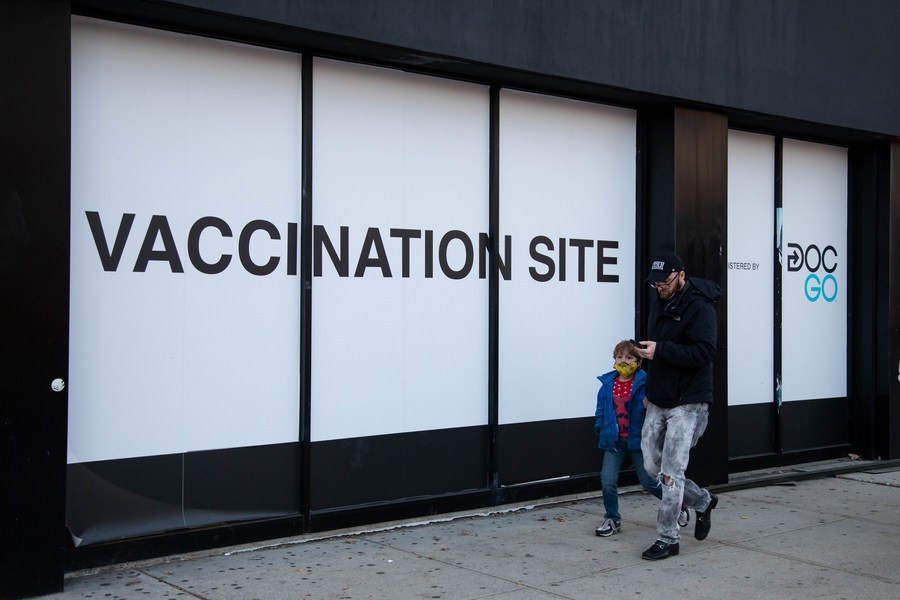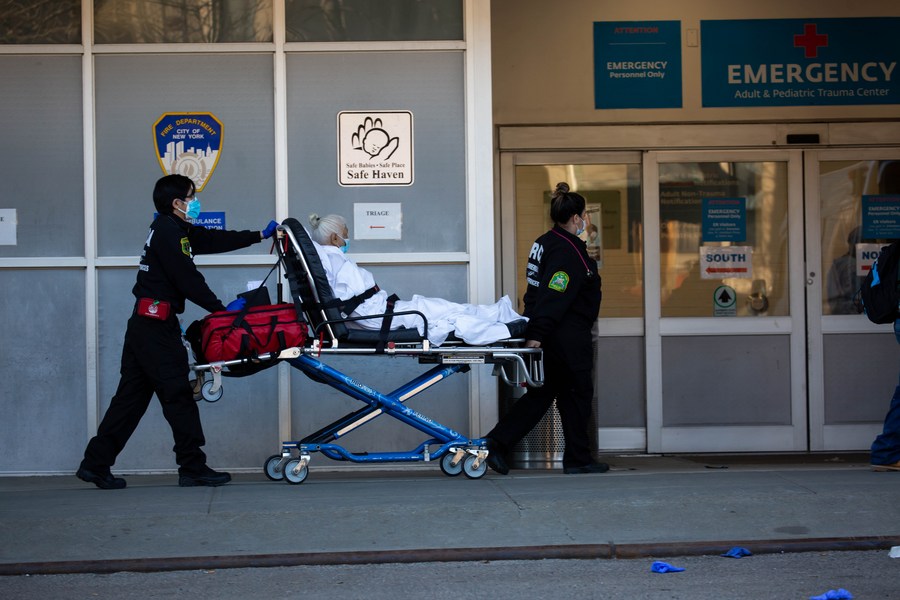U.S. COVID-19 vaccination uneven, high rates among federal personnel

Pedestrians walk in front of a COVID-19 vaccination site in the Brooklyn borough of New York, the United States, Nov. 19, 2021. (Photo by Michael Nagle/Xinhua)
As other industries with workers in public-facing roles, like airlines and hospitals, have moved toward requiring COVID-19 vaccines, "retailers have dug in their heels, citing concerns about a labor shortage," reported The New York Times.
NEW YORK, Nov. 25 (Xinhua) -- Some 92 percent of U.S. federal employees and military personnel have received at least one dose of coronavirus vaccines, far above the national level of less than 70 percent, while daily COVID-19 cases nationwide hover well above 90,000 during the holiday season.
Among them, nearly 5 percent more have asked for exemptions on religious or medical grounds, the White House said on Wednesday. At the largest federal agency, the Defense Department, 93.4 percent of military and federal personnel combined have received at least one vaccination dose, while another 5.5 percent have asked for exemptions, The Washington Post reported.
Among civil servants, vaccination percentages range from 86.1 percent at the Agriculture Department to 97.8 percent at the Agency for International Development (AID). Percentages of employees asking for exemptions also vary, from 10.2 percent at the Department of Veterans Affairs to 1.3 percent at AID and the State Department, said the report.
As of Thursday morning, 231,367,686 people have received at least one dose of COVID-19 vaccine, making up 69.7 percent of the whole U.S. population; fully vaccinated people stood at 196,168,756, accounting for 59.1 percent of the total, official data show.
WORRISOME GROUPS
As other industries with workers in public-facing roles, like airlines and hospitals, have moved toward requiring COVID-19 vaccines, "retailers have dug in their heels, citing concerns about a labor shortage," reported The New York Times (NYT) on Thursday. "A portion of one of the country's largest work forces will remain unvaccinated."
At the heart of the retailers' resistance is a worry about having enough people to work. In a tight labor market, retailers have been offering perks like higher wages and better hours to prospective employees in hopes of having enough people to staff their stores and distribution centers, according to the report.

An employee works at a grocery store in Washington, D.C., the United States, on Nov. 10, 2021. (Photo by Ting Shen/Xinhua)
The industry showed how strongly it feels about the issue this month when the (Joe) Biden administration directed companies with 100 or more workers to mandate vaccines or weekly tests by Jan. 4. "Five days after that announcement, the National Retail Federation sued to stop the effort," said the report.
Meanwhile, according to the Centers for Disease Control and Prevention (CDC), as of Tuesday, only 13 percent, or slightly more than 3.5 million of the nation's 28 million children from ages 5 through 11, have already received their first dose of COVID-19 vaccines, in the month since that age group was granted eligibility.
"The central goal of vaccinating children against the coronavirus has largely been for their own health and, more broadly, to ease the strain on school and day care systems that are in a perpetual cycle of shutdowns, testing and re-openings as children become infected," said NYT in another report on Thursday.
For some families with several generations or worrying about a family member with a severe illness, the vaccine for young children is a crucial barricade of protection for the others. "It's a hug recovery program, with giant stakes," said the report. Immunized children have also become a force shield for families in places where overall vaccination rates are low.
STRAINED HOSPITALS
The U.S. federal government has granted a request from Governor Gretchen Whitmer for staffing assistance to support medical personnel treating COVID-19 patients amid a surge in infections in Michigan, reported The Detroit News on Wednesday.
Under the agreement, two teams of 22 members each will help staff at Beaumont Hospital in Dearborn and Spectrum Health in Grand Rapids. The teams will include registered nurses, doctors and respiratory therapists and will arrive next week.

Medical workers wheel a patient into the emergency room at Maimonides Medical Center in the Brooklyn borough of New York, United States, March 8, 2021. (Xinhua/Michael Nagle)
"Hospitals are at capacity across the state, particularly in Metro Detroit and West Michigan, and this is taking a tremendous toll on our health care workers," Elizabeth Hertel, director of the state health department, was quoted as saying.
Hospitals in Massachusetts will cut back on non-urgent scheduled procedures starting on Monday because of staffing shortages and longer patient hospital stays, NYT on Wednesday quoted the state's health authorities as saying.
Coronavirus cases have been rising in Massachusetts for several weeks, but hospitalizations have risen at a lower rate. The staffing shortage was largely driven by the pandemic, but the pressure on hospitals relates to other COVID-19 consequences.
The pandemic has contributed to the loss of some 500 medical, surgical and ICU hospital beds in Massachusetts, and hospitals are seeing an influx of patients who delayed visiting the doctor when COVID-19 cases were higher, according to the report.
Photos
Related Stories
- Racial inequities pervasive in U.S. health system: study
- Hohhot launches COVID-19 vaccination campaign for children aged 3 to 11
- China-developed oral COVID-19 drug expected to be approved for market use in December
- COVID-19-related deaths in Europe could reach 2.2 mln by March 2022: WHO
- Data show U.S. is hurting democracy worldwide: Russian broadcaster
Copyright © 2021 People's Daily Online. All Rights Reserved.










